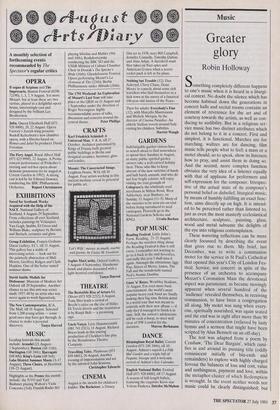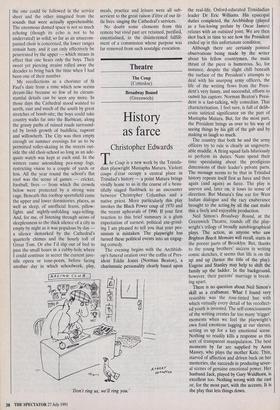Music
Greater glory
Robin Holloway
Something completely different happens to one's music when it is heard in a liturgi- cal context. No doubt the silence which has become habitual down the generations in concert halls and recital rooms contains an element of reverence for the art and of courtesy towards the artists, as well as con- ducing to audibility. But in a religious ser- vice music has two distinct attributes which do not belong to it in a concert. First and simplest, it is functional. Marches are for marching, waltzes are for dancing, film music tells people what to feel; a mass or a motet should, so to speak, show its listeners how to pray, and assist them in doing so. And the second, more complex function obviates the very idea of a listener equally with that of applause for performers and self-expression for the composer. Irrespec- tive of the actual state of its composer's personal belief or disbelief, liturgical music, by means of humbly fulfilling an exact func- tion, aims directly up on high. It is intend- ed to be perceived rather than listened to, just as even the most masterly ecclesiastical architecture, sculpture, painting, glass, wood and metal subsume the delights of the eye into religious contemplation.
These wavering reflections can be more clearly focussed by describing the event that gives rise to them. My brief, last December, was to write a communion motet for the service in St Paul's Cathedral that opened this year's City of London Fes- tival. Service, not concert: in spite of the presence of an orchestra to accompany Mozart's Coronation Mass the devotional aspect was paramount, as became movingly apparent when several hundred of the `audience' revealed themselves, in receiving communion, to have been a congregation all along. My motet was sung when every- one, spiritually nourished, was again seated and the end was in sight after more than 90 minutes of concentration (relieved by lusty hymns and a sermon that might have been scripted by Alan Bennett on an off-day).
The text was adapted from a poem by Crashaw, 'The Dear Bargain', which rami- fies in and around its punning title (oddly reminiscent initially of bin-ends and remainders) to explore with highly charged fervour the balances of loss and cost, value and nothingness, payment and love, within the metaphor-cluster of which Redemption is wrought. In the event neither words nor music could. be clearly distinguished; but
the one could be followed in the service sheet and the other imagined from the sounds that were actually apprehensible. The enormous domed space is not so much echoing (though its echo is not to be underrated) as solid; so far as an unaccom- panied choir is concerned, the lower ranges remain hazy, and it can only effectively be penetrated by the upper -- which means in effect that one hears only the boys. Their sweet yet piercing strains rolled away the decades to bring back the time when I had been one of their number.
My recollections as a chorister of St Paul's date from a time which now seems dream-like because so few of its circum- stantial details can be seen any more. In those days the Cathedral stood waisted to north, east and much of the south by great stretches of bomb-site; the boys could take country walks far into the Barbican, along the grassy paths of ruined roads surround- ed by lavish growth of buddleia, ragwort and willowherb. The City was then empty enough on summer evenings for us to be permitted roller-skating in the streets out- side the old choir-school so long as an ade- quate watch was kept at each end. In the winters came astonishing pea-soup fogs, restricting vision to a couple of yards or less. All the year round the school's flat roof was the scene of games — cricket, football, fives — from which the crowds below were protected by a strong wire cage. Beneath this rooftop sportsfield came the upper and lower dormitories, places, as well as sleep, of unofficial feasts, pillow- fights and nightly-unfolding saga-telling. And, for me, of listening through aeons of sleeplessness to the thick silence of a city as empty by night as it was populous by day a silence demarked by the Cathedral's quarterly chimes and the hourly toll of Great Tom. Or else I'd slip out of bed to pass the small hours in a cubby-hole where I could continue in secret the current juve- nile opera or tone-poem, before facing another day in which schoolwork, play, meals, practice and leisure were all sub- servient to the great raison d'etre of our lit- tle lives: singing the Cathedral's services.
No doubt some elements from this remote but vivid past are retained, purified, essentialised, in the disinterested fulfill- ment of a commission whose purpose was far removed from such nostalgic evocation.



















































 Previous page
Previous page